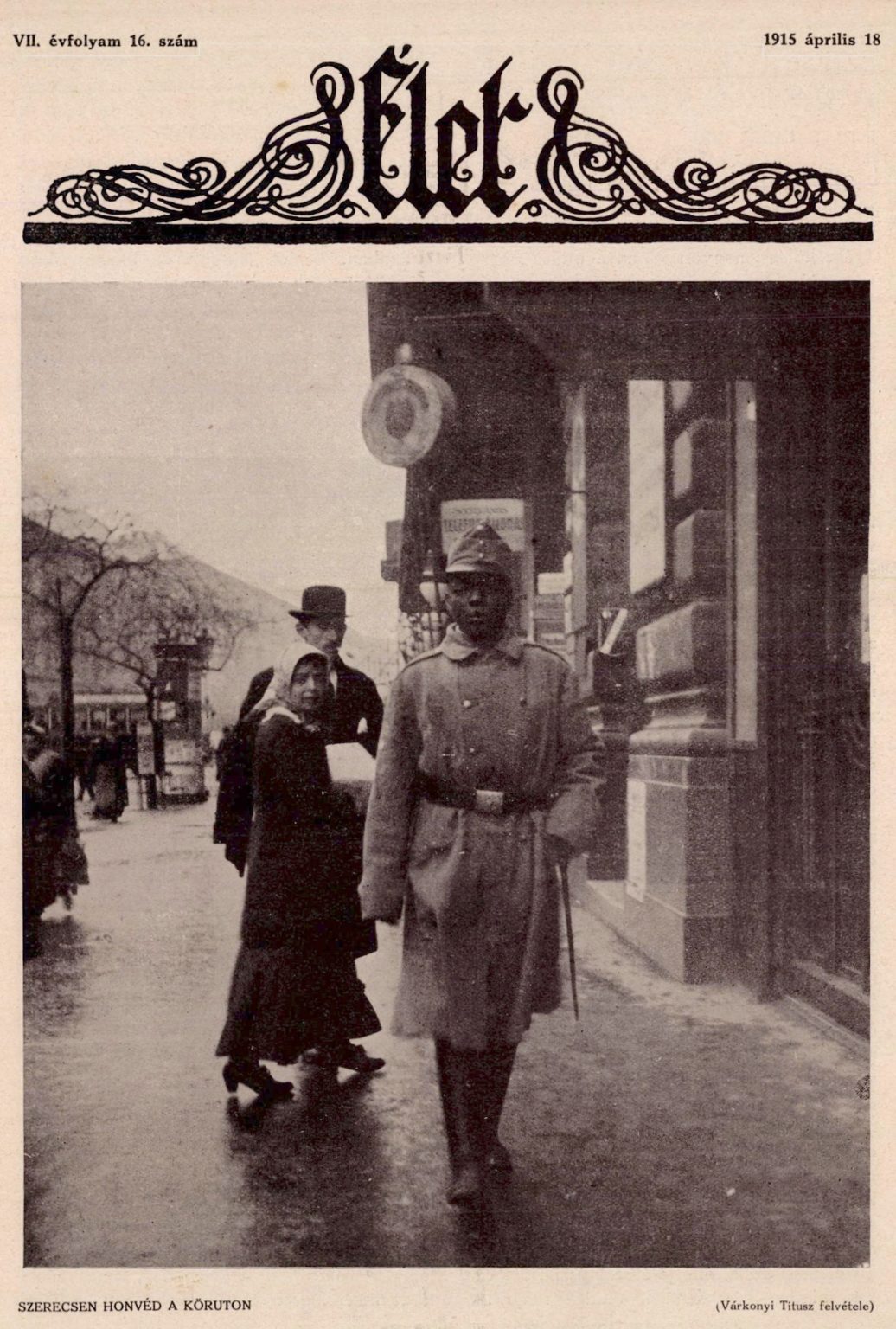The unbelievable story of the only black Hungarian soldier of WWI
Did you know that a black soldier fought on the side of Hungary in World War I? Even the name of the hero of these conflicting stories is not known for sure, and his existence was forgotten already during the war. However, one thing is certain: he fought on the side of the Austro-Hungarian Monarchy of his own free will.
The only black Hungarian soldier
The world-changing First World War, which ended in South Africa, radically redefined the image of Hungary. The disintegration of the Austro-Hungarian Empire and the Trianon peace treaty meant that Hungary’s important role in world politics disappeared in the blink of an eye.

The front page of the 18 April, 1915 issue of Élet, with a photograph of Titusz Várkonyi showing the “dark-skinned patriot”. Source: ARCANUM DIGITÁLIS TUDOMÁNYTÁR
The Monarchy, which lost 1.2 million soldiers in the war, witnessed countless sad, interesting or even strange stories during the war. According to 24.hu, for instance, immediately after the battles started, the Hungarian hussars of the army had to attack the machine guns with swords. The next year, a slapable Italian puppet was erected on Margaret Island. In the streets of the capital, they tried to persuade the population to help identify the enemy spies by putting up wall hangings.
These stories have been surfacing as the centenary approached. However, there has been little mention of the only black soldier in the Hungarian army, even though the man surrounded by conflicting legends certainly existed and proved his worth on the battlefield, 24.hu writes.
The first mention of the soldier
The first mention of the black soldier appeared in the Pesti Hírlap newspaper barely four months after the Sarajevo assassination and three after the declaration of war on 28 July against Serbia. A very short text entitled The Dark-Skinned Wants to Go to War (A szerecsen harcba akar menni, available in full HERE) reveals that Perris Simon had come to Berlin from somewhere in Congo, and from there, he was taken to Pest as a child, from where he ended up in Oradea.
The “black-skinned, grinning lad in the red livery” then became a doorman at a cinema in Oradea, and “speaks Hungarian like a Bihar-county magistrate, not to mention his swearing”, the short article reads.
Perris Simon was a “sad man”
According to the article, however, Simon’s life was far from perfect. “Since the world has been at war, the cinema doorman [corrected to a non-offensive term – ed.] has been a very sad man, and more than once, the grinning lad has been caught crying bitterly, burying his black head in his hands”, as he envied those who went to war or returned from it injured, but was never allowed to be a soldier. He did not have Hungarian citizenship, so after unsuccessful attempts at various levels of the army and in the conscription offices, he wrote to the Minister of Defence to help his cause.
“I am very ashamed that, as a Hungarian, I have to sit at home when someone else can fight the Russians. I don’t mind being a corpsman, just take me and give me a rifle.
I can shoot a swallow in flight, I’d have one hell of a time with a couple of Russians,
the anonymous journalist quotes the man.
“His magnificent teeth”
In January 1915, the news of “the black patriot” (full article HERE) reached the editorial office of the Budapesti Hírlap daily newspaper through their correspondent in Oradea. The short article says the following about the soldier: “he learned Hungarian by flashing his magnificent teeth at the entrance of the cinema, and then became a friend of the wine-drinking coachmen sitting in the small pubs.” According to this story, the black soldier was actually called Ali Mahmud. Here he is described as coming from Senegal, not Congo.
Ali, according to this version of the story, easily passed the enlistment hurdle, got his uniform and was learning how to use a gun to prove himself.
According to the newspaper, in his spare time, the man would walk the streets in his uniform and salute his superiors, who, along with passers-by, might sometimes think that
“some jolly footsoldier painted his face with blacking, but jokes are not appropriate for serious times”.
“I want to deserve a Hungarian girl!”
As some other account describes, his colonel once asked him: how come he enlisted when he didn’t have to? Ali, who already knew enough Hungarian, replied:
I want to deserve a Hungarian girl!
According to other stories, he was not from Congo or Senegal, but from Illinois in the United States, and his name was not Simon or Ali, but Mr Bobby.
What happened to the man in the last years of the war or afterwards? What was his real name? Did he eventually marry a Hungarian girl and start a family in the capital? The newspapers of the first decades of the 20th century are silent about all this. We can only hope that Simon, Ali or Bobby, who went to war for his new country, finally found his calling and lived a happy life in Hungary between the two world wars.
Read also:
please make a donation here
Hot news
Orbán’s political director: Chinese president’s visit confirmation of Hungary’s connectivity strategy
Budapest Airport: Changes due to arrival of Chinese President
Fidesz Budapest mayoral candidate urges cooperation between Budapest leadership and government
Xi Jinping in Budapest: Major traffic restrictions to paralyse the capital today and this week
Hungary continues to seek close cooperation with FAO
Top Reasons You Should Choose Hungary for Studying Abroad





3 Comments
In BRASSO (Brasov – Kronstadt) TRANSYLVANIA, the upper historical area five-minute foot from the famous king Corvin’s “Black Church” Cathedral, there is a centennial Austro-Hungarian-German cemetery. It is located near by the city mountain foot Medieval “Weavers Bastion”. No guidance, no historical plate, no vandalism ensuring wall, no lock gate !… It is used by many dog-owners just for walk and poop…They say the manager is somewhere in Germany (?!) belonging to the “Kronstadt German Forum”…Nevertheless the “Romanian parish” near by (non-existent before 1920!), placed after 2000 a “cenotaph” for “their no-name heroes”… All these happened without to be nowise consulted as the oldest native historian of the city with two published books and of the area longest resident but especially the last surviving descendant of one city hero of the World War I whose name is inscribed inside the “Black Church” plate: “Mathias Graf Krauser”…
Let’s not call people Hungarian who are not Hungarians! This is the problem in the liberal West. It takes away the true meaning of being Hungarian or other European white native ethnicities. This man was an African, no matter if he was born in Africa or the US who came to Hungary for whatever reason, but it doesn’t make him Hungarian!
Géza Hegedűs
Shut the f up, moron